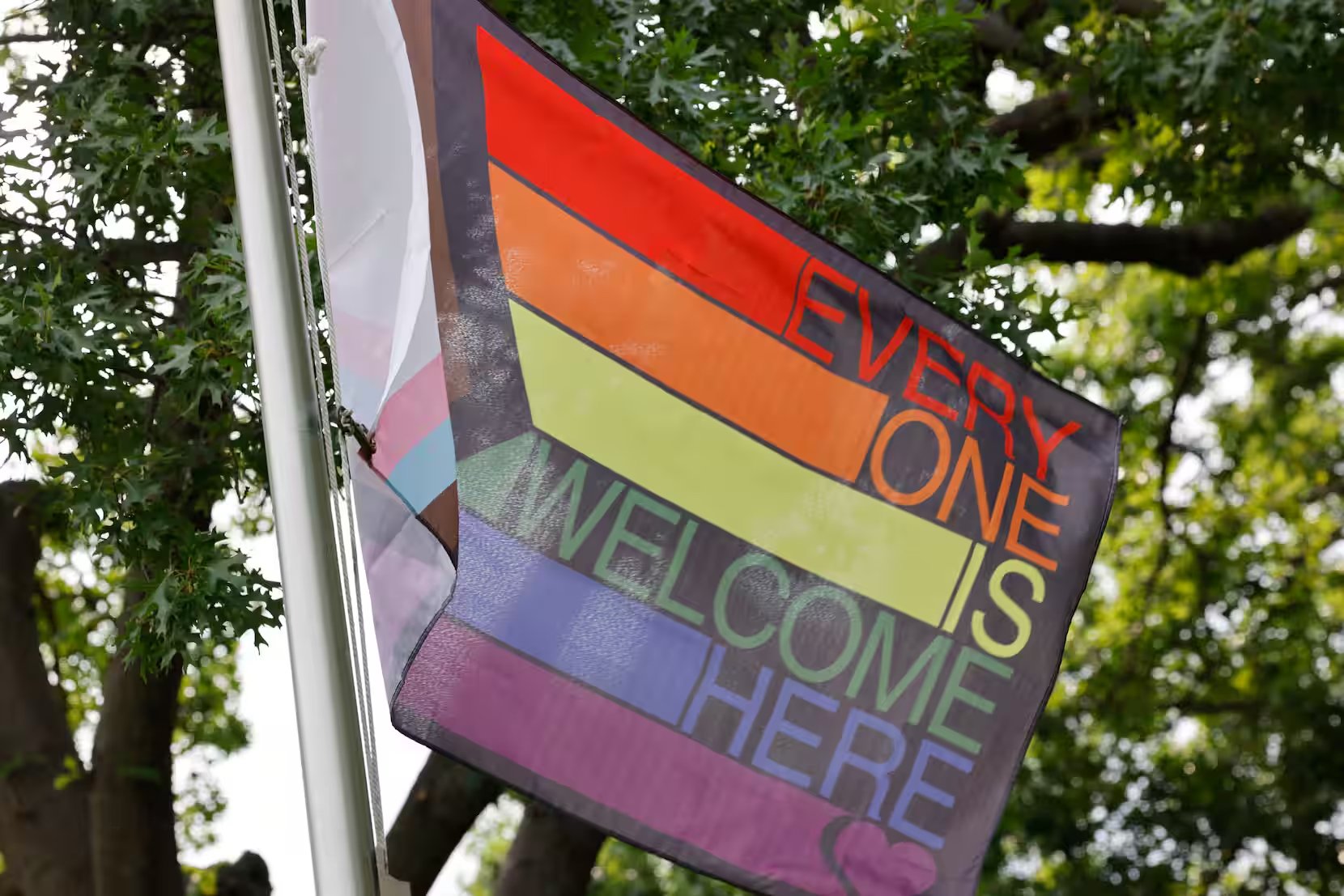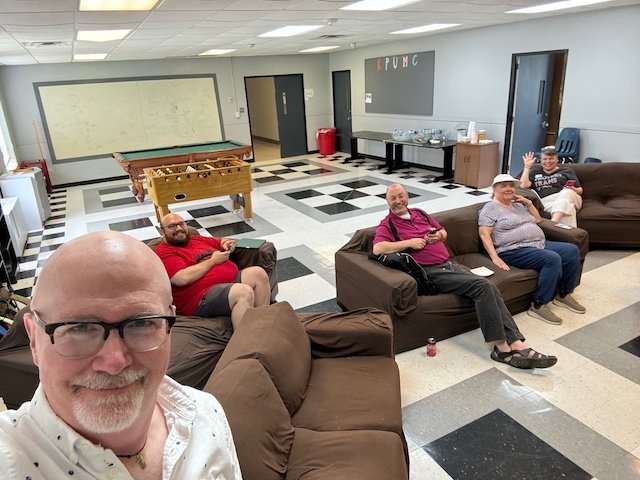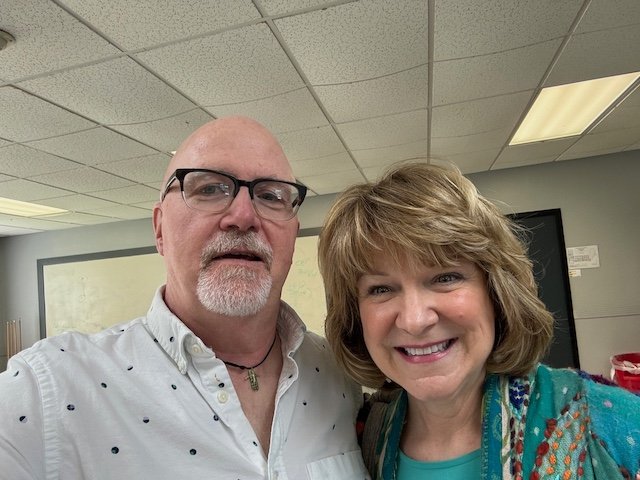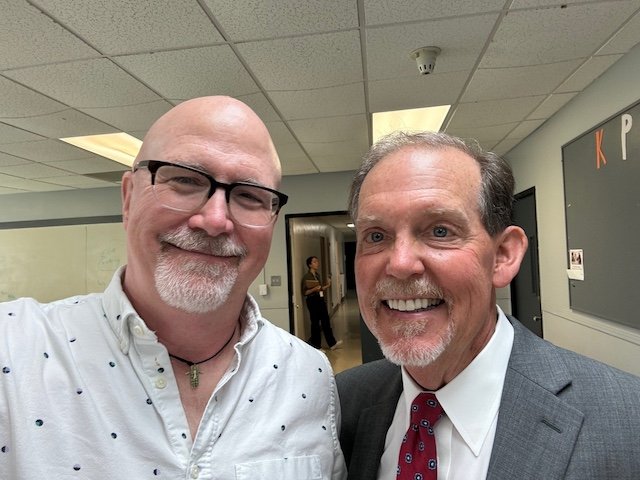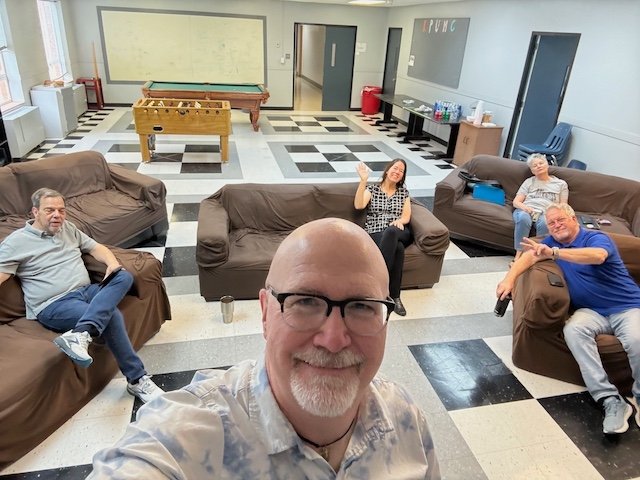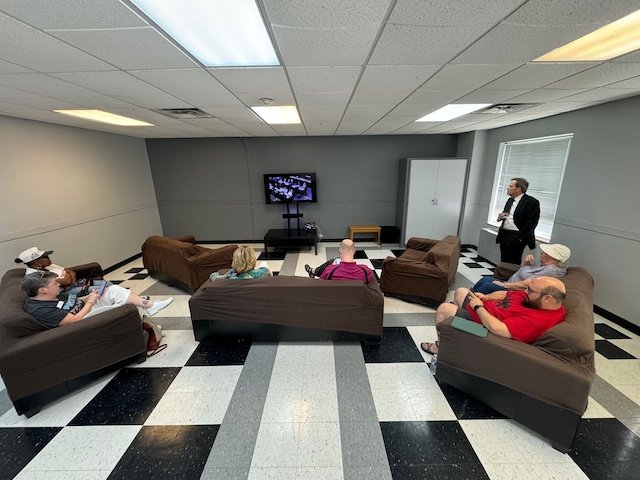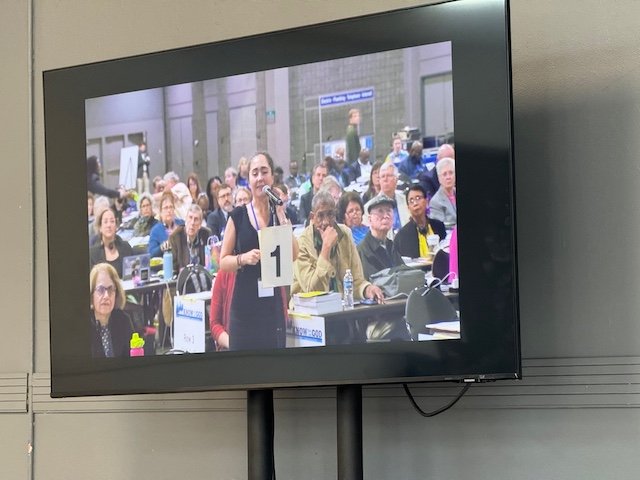by Rev. Eric Folkerth
This week, the General Conference of the United Methodist Church will begin in Charlotte, North Carolina. This will be the first “regular” General Conference since 2016. I thought I would put down a few thoughts ahead of this potentially momentous week for the new United Methodist Church. These will be a combination of personal reflections on where we have been and my usual “Inside Baseball” discussions of where we might be going in terms of votes and issues.
I’ve been asked about a half dozen times in the past few months if I plan to attend. The short answer is - “no” for two broad reasons.
The first reason is that in all transparency, General Conference brings up considerable “PTSD.”
Without making this post all about me, let me tell you the stuff I remember…
I lived through, and attended, several GCs in the period between 2000 and 2016. I was pastor of a Reconciling United Methodist Church, one of only two in North Texas, at the time of my appointment.
During that first decade of serving more progressive United Methodist Churches, we were a small, if mighty, band of the faithful. Politically, Progressives were a blue dot in a very Red Dallas County. Theologically, it was much the same. Again, perhaps only three or four United Methodist Churches would willingly admit to being “Progressive” in those days. Progressive congregations saw themselves as a distinct minority, keeping alive the hope of a church where “All” truly means “All.”
We did a lot of organizing around General Conference and issues of human sexuality.
In the late 1990s, the congregation I served wrote an entire book (clearly too optimistically titled) called “Finishing the Journey.” Upon my arrival, it was revised and copies were sent to every delegate to the General Conference.
Our members participated in the national Reconciling Ministries Network (RMN) strategy every year. We attended General Conferences, RMN Convocations, and did a LOT of work locally.
Our congregation met with local North Texas “delegates” to the General Conference around issues of human sexuality at the LGBTQ community prior to every session every four years.
This involved our members —who were themselves either LGBTQ persons or a family member— setting lunch and coffee meetings with our delegates and sharing painful stories of rejection at the hands of Christian Churches. Our members intentionally revisited their own traumas in an effort to win the hearts and minds of our “delegates.”
More than once, these local leaders…often Moderates more than Conservatives…would talk of how these messages of witnesses, along with their own “faith seeking understanding” had helped them change their minds.
We did this in other churches, too. We visited other churches —those we knew were “Progressive” in theology—and urged them to join the movement.
(The RMN movement now very clearly posits itself as intersectional in its understanding of the inclusion of all people….like the rainbow flag itself, it’s a signifier of a larger commitment to broad social justice, not just the LGBTQ work…)
Locally, that kind of strategy absolutely worked, as I will return to in a moment.
But, in the end, every General Conference would again and again feel like another kick to the gut. In our physical bodies, not just our souls, we would feel it…for weeks, months, and years afterwards.
Therefore, despite the demonstrable gains we achieved, as it pertains to General Conference, they always ended up being a moment of re-traumatization for all of us who truly believed and lived the phrase, “All Means All.”
We would come home to national news stories about how the United Methodist Church had become *more* conservative. I would watch LGBTQ folks who came to our Church believing they had finally found a safe harbor for themselves and their families once again feeling betrayed by yet another branch of organized Christianity. In a sense, they’d feel as if they’d again been “tricked” by another Christian Church…promised full inclusion while the fine print of the denominational rules appeared to say otherwise. (Appeared…)
In the midst of my own physical and spiritual pain, I’d watch helplessly as members either in righteous anger or deep sadness (often both) withdrew from the United Methodist Church and our Church, and either united with more progressive Christian denominations or drifted into the ever-growing throng of those called the “Nones” and “Dones.”
Remarkably, after every General Conference, once a period of anger/pain subsided, another period of growth would come to us locally.
But we were becoming modern day Sisyphus. It seemed we’d always get gut-punched again, four years later. It is very easy to see how such a dynamic could come to feel spiritually abusive and why some folks chose not to stay. Those of us who *did* stay did so with an understanding that we were fighting an uphill battle.
Especially during those first ten years (2000-2010), I allowed my own personal health to become severely compromised. I ate my feelings, and I became morbidly obese, completely failing to take my own health seriously.
(This means, of course, ⅓ of the Great Commandment…to “love yourself”… seriously as well). I am not blaming “The Church” for this. I am explaining *why* I will not be attending.
For my own personal health and ongoing PTSD, I will not be attending General Conference. For years, I used to tell everyone that no one can judge anyone’s decision to “stay or leave” United Methodism.” I still deeply believe that. Church membership is (or, should be) an act of faith between a Christian and their God.
When those hundreds —and, it was hundreds— of members left us over those years, I grieved deeply. But I defended their faith-choice too.
(This is probably a good reminder for all of us in the present-day UMC, as we deal with our feelings toward those who have “disaffiliated”…)
It took remarkable courage to leave.
It has taken remarkable courage to stay and fight.
And, in the end, if we really are living out our Christian faith, we must trust in God to lead us into whatever space, and place, God calls us to be faithful.
So, look, I’m not sharing any of the preceding few paragraphs —the first reason why I am not going to General Conference— to ask for any great sympathy. Whatever trauma I still carry pales in comparison to what’s been done to the actual queer community over the years.
But when folks seem surprised that I am not going, especially since it appears things might go quite well, legislatively…this is why.
But there is a far more optimistic reason I will not be attending General Conference 2024; and telling the whole story means I must mention this too…because it truly is the center of my hope and optimism.
The “rest of the story” is of my own true faith in Jesus Christ and the future of the United Methodist Church, my calling to trust the “next generation.”
Because what has also emerged since the last “regular” General Conference in 2016 are entirely new cohorts of leaders who are picking up the cause, engaging in the work, and giving me incredible hope for our future.
Alongside every gut-punch General Conference, simultaneously Christianity (and America) was undergoing a remarkable change too. As I often say, the United Methodist Church tends to mirror, not lead, our culture.
As with America —which has demonstrably become “Center-Left” since the late 1990s— Progressive and Moderate United Methodists were “losing” the struggle at General Conference. But we were gaining everywhere else.
(If you are confused by my assertion that America is a “Center-Left” country, please find writings on this at WhenEFTalks…it’s a demonstrably provable assertion of the true views of most Americans…)
In North Texas, we saw the number of Reconciling Churches move from only two to almost ten, with perhaps a half dozen more who are clearly “Progressive” in nature.
Same Sex Marriage, thanks be to God, became legal in the United States.
Even in our most rural areas, we started to see clergy and lay folks defending queer people. What we have found —especially in the period since Same Sex Marriage became legal— is a remarkable number of clergy in rural and suburban areas who now openly speak and act of their acceptance of the queer community…and who encourage their congregations to do the same.
The “Fight” is over and has been for a long time now in our big cities. But these rural and suburban United Methodist pastors (those who speak up and show up) are modeling true courage.
This is similar among our “Big Church Pastors” in Dallas…many of whom have moved from uneasy silence to clear support for LGBTQ persons. (Again, this is clearly not everyone. But to fail to note their work also fails to honor it too….) I personally witnessed “big church pastors” — who tend to be more moderate than me, for sure — take stands that were truly courageous for their contexts. Following 2019, I saw them, finally, stand up to the “Traditionalists.”
We saw this in our Cabinet too. I personally saw them defend the rights of Progressive United Methodists just as strongly as they had always defended faith of the “Traditionalists.” Our large-church pastors, even, have used their voices and influence to advocate for a true “One Church” model/metaphor for our future together.
(Which, really, was always the heart of that model…)
Note: I am not saying everybody in North Texas became a left-wing Christian. Far from it.
But what definitely happened, what just about everyone in North Texas agrees happened, was a shift of alliance that foretold what was about to happen in the denominations’ whole:
The Moderates and the Progressives decided they wanted to stay together, and the Conservatives overplayed their hand.
I don’t mean to sugarcoat any of this. There were colossally bad decisions still sometimes still made, down to the very recent moment. And every bit of progress is always too often accompanied by continued heartbreak or foolishly high levels of fear by those in places of “power.”
But something shifted, and telling the story means being honest about this shift too.
And so, by the time we elected our last batch of “Delegates” (2019) to General Conference, it was very clear to me that we here in North Texas are now in good hands.
Younger clergy and passionate younger lay folks —Moderates and Progressives— were stepping up, showing up, and making a difference.
And so, their presence gives me new and renewed hope. And my own faith in God has taught me to trust their leading and to not just step in and try to “control” things behind the scenes.
One of my life lessons during the past decade is: Usually when we humans try to “control” things behind the scenes, we will simply create unwanted “unintended consequences” later. I see this in both Church Leadership and Politics.
But if we are to trust in the leading of God, we’ve got to trust in the leading of God.
We’ve got to understand that each of us has a role to play, and none of us controls the entire drama. (I am thinking of Niebuhr’s Serenity Prayer here.)
This is not hopeless acquiescence. This is hope-filled TRUST.
As usual with me, these are a lot of words to make a short point: I’m not going for both personal and strategically faithful reasons.
So….with all that incredibly long prolegomena, let’s switch to a little “Inside Baseball for Methodists.”
As you know, I love to think about game theory and General Conference too. Because, whatever else General Conference is, it’s an organization explicitly designed to mirror democratic political values….just as our American political system is. That is not to say (as we can also not say about politics) that the system is “perfect.” Far from it.
In fact, in another way that the United Methodist Church mirrors America, both systems clearly often fail to live up to their highest core ideals, and both systems can be “gamed” by partisans with an agenda.
This is clearly what we’ve seen, for forty years now, from Conservatives in the UMC, who have done all they can to cling to control, all while their own positions on human sexuality have become so toxic that they won’t even admit anymore that this was their original concern.
Conservatives now pretend they’re leaving the denomination because they want “local control” or because they fear some kind of progressive retribution.
(This is, again, another symbol of how much THEY know the acceptance of homosexuality has shifted within the Church…)
One final reminder, before my game-theory thoughts…
We United Methodists tend to think we are good at politics.
We are NOT good at politics.
We are BAD at politics.
We exist inside a system designed around democratic voting and elections, and we honestly have no idea what we are doing, most of the time.
My life has given me an upfront seat into ACTUAL politics….and, trust me, these games we play inside the Church pale in comparison to what happens in the political area.
(Pretending we are good at politics is, again, one of our own United Methodist bits of hubris. I am speaking now to ANYONE in the UMC…Conservative, Moderate of Political. Beware our own unacknowledged political hubris….)
All of these incredible caveats now out of the way…what’s going to happen at the UMC General Conference?
Beats me.
Sorry to tease you for several long pages and then get coy. But if we’re all being honest…we all have no idea. This is part of the humility and attempt to avoid hubris that I just spoke about. This is a part of my own PTSD. This is because of being wrong so many times before.
But, starting with my very old - and always right - assumption that “elections are all about math,” it seems like we can make certain assumptions based on what’s happened to the membership of the UMC since 2016…and especially following 2019. And those assumptions make me optimistic in a way I have not been for a very long time…
Here’s a few math-based assumptions for you…
One quarter of all United Methodists and congregations have left the denomination. (24% of people. 25% of churches).
Virtually ALL of those were “Conservative,” “Traditionalist,” (whatever you want to call them…)
This means, as I’ve written before, the UMC is now a “Center/Left” denomination, just like America.
A significant effort has been made to replace those more Conservative “delegates” with those who, it stands to reason, lean more to the Center or Left.
Many International Bishops and Conferences, notably in Africa and the Philippines, have made public commitment to “regionalism” and to stay as United Methodists, understanding implicitly that the denomination is now Center-Left, and that the American Church will likely shift on human sexuality.
Given these assumptions, IT APPEARS QUITE CLEAR that there should be a more than credible path for any vote that requires “Simple Majority.”
It also indicates that JUST A FURTHER SMALL shift in other voting patterns would give a credible path to a ⅔ Super Majority vote (Required for regionalization…)
How do I get to this?
The following back-of-envelope math, taking the 2019 vote on the “Traditionalist Plan” as a baseline and shifting ¼ of votes.
2019 vote on Traditionalist-vs-One Church Plan:
459-403 (862 votes cast) in favor of the “Traditionalist Plan.”
A 53%-47% in favor of Conservatives.
Intervening Data: 25% Dissafiliation on “Traditionalist” side: 115 votes out of the 459 total.
New Potential 2024 Tally Counting American Shift Only:
Progressive/Moderate: 518
Conservative: 344
A new 60%-40% shift in favor of Moderates/Progressives.
This is why I assert that any Progressive-to-Moderate legislation that takes simple majority could credibly have a result of as high as 60%-40% in favor of change. It might not be that high but very credibly could be.
Game Theory suggests this could even be a conservative guess. Some folks who have been on the fence in the past might just switch votes to be on the winning side…could be, not guaranteed…
But!
This does not account for *any* shift in the International Delegates.
And we know there have been some.
Known International Facts:
1. The Philippines supports regionalization.
2. Eight currently serving African Bishops have publicly stated that they support regionalization.
3. As I’m writing this, the more conservative Russian church will likely be leaving too (I’ll no doubt have something to say about that in the future…)
Are they all becoming “liberals?” No.
Do they all support changing the Discipline on human sexuality? No.
But…if even as few as 6.4% of delegates from the Philippines and Africa shift, that should create supermajority in favor of a regionalization vote.
Of course, nobody knows how ANYBODY will vote ahead of time. All these assumptions could be way off…but they are back-of-napkin “swags” that make credible sense, based on the best available data.
Is that going to happen?
Again, this is where I have to say “I have no idea.”
If I had less PTSD, I might say it WILL happen.
But we know that the same manipulative Good News coalition (the small part of it that remains) is still active. And, folks, they are good at politics…
I have always been pretty good at looking at the “forest,” and I have a harder time looking at the “trees.”
This is why I was incredibly skeptical about the “One Church Plan” passing in 2019….I just didn’t understand how the math worked…and I was clearly right.
But now, given the defections within the UMC…those who’ve left for other places…given the very hard work that’s been done with the remaining international church…there seems a credible path forward.
Not guaranteed, but credible.
As General Conference starts, I have several prayers for all those who will be United Methodist:
First, that every delegate remember that there are real human beings behind each of these “issues.”
I fear that everyone, on all sides, tends to forget this. We too often “talk about” Queer people, outside of their presence. We fail to remember how horrible it must feel to be “talked about” by a political/religious system like the General Conference. This was something I was convicted on in the mid 2010s. And I try to remember it still.
Secondly, that we trust that those who are still “on the fence” about human sexuality still be allowed a place in the United Methodist Church, so long as they are willing to live in a truly “Big Tent” denomination.
This was the moral/theological heart of the “One Church Plan,” and in my opinion, it is still the best path for the UMC.
Despite just now writing pages and pages about political machinations, my own passion in life is: Helping folks change their hearts and minds through their faith in Jesus Christ.
This has been the story of my own evolving faith for forty years. I started life as a Conservative North Dallas Republican, and anybody who fails to remember this fails to understand. God has saved me through my study of scriptures, my faith in Jesus, and my walk within the UMC. And I know that there are many more like me out there still.
But because our culture is so terribly balkanized, we are losing the ability to talk with each other along political and religious lines. (Again, this is another example of how the United Methodist Church mirrors our culture….)
Conservatives have decided they can no longer be in fellowship with the rest of us. We are moving out of a time of disaffiliation.
We see this balkanization in politics…where intentionally gerrymandered or “packed” areas predictably result in ever-more extreme political ideology.
(Don’t miss: I’m suggesting this is happening on both sides…)
If we intend to have a country or an international denomination that truly welcomes “ALL” to the table, then we’ve got to continue to intentionally make room for all inside our systems. (Again: with the caveat that “All” means, “all who can coexist, in a true Big Tent, with those they sometimes disagree with….”)
We must, clearly, get rid of all the discriminatory language in our Discipline.
But for anyone —Left, Right, or Center— who expects, wants, or seeks a United Methodist Church that becomes “Ultra Liberal,” rejecting anyone who in good faith can continue to walk with us, count me out.
My desire has been to continue to trust that Jesus will change hearts and minds and that these changes are healing for our nation and world.
Because I’ve seen it happen.
Because it happened with me.
Because it’s happened in the churches I’ve served.
And it's a major part of how I understand the concept of "conversion."
Jesus seeks to convert us all from our own regional and local tribalism to an embrace of all of humanity, as Children of God. This was the mission that got him killed, and the inherent tribalism deep within every human being still makes it challenging today.
But I can only tell you what I’ve seen. I've seen conversion among older straight White folks in Dallas churches tell me that their connection with LGBTQ persons helped save…helped spiritually save them, through faith in Christ… from their own closed views.
People CAN change.
And if we ever get to a place where we believe it’s no longer possible to change or create a denomination that does not invite folks to change, then we’re really also failing to believe that Jesus has any power at all in our world to change our hearts and minds.
Balkanization is destroying the fabric of American society. Authoritarianism is on the rise, everywhere in the world.
The new United Methodist Church has the potential to be an almost unique institution in our country and world, bringing together….
Conservative/Progressive.
Rural/Urban.
Rich/Poor.
And people of all orientations and races…at a single denominational table.
This must be our calling.
And I’m not joking when I say that, if America has a chance of surviving, if our world does not descend into autocracy, we’ll have some very hard ministry to do to help that happen.
I’m ready for that future, and I’m cautiously hopeful that, through God’s grace, this is where we’re going.


